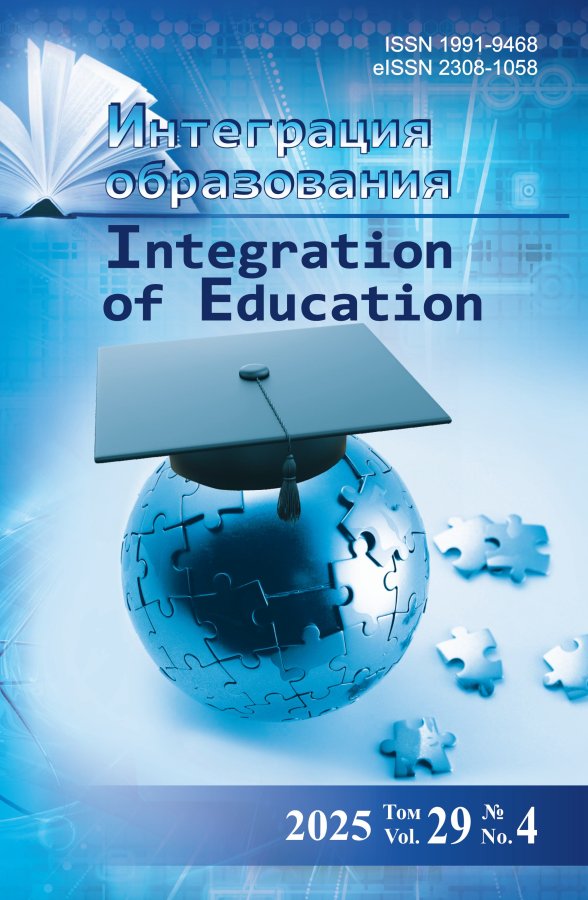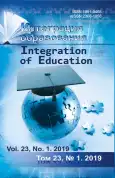Формирование педагогической одаренности как ключевое условие повышения эффективности современной образовательной системы
- Авторы: Мазилов В.А.1, Слепко Ю.Н.1
-
Учреждения:
- ФГБОУ ВО «Ярославский государственный педагогический университет им. К. Д. Ушинского»
- Выпуск: Том 23, № 1 (2019)
- Страницы: 37-49
- Раздел: Педагогическая психология
- Статья получена: 22.05.2025
- Статья одобрена: 22.05.2025
- Статья опубликована: 15.03.2019
- URL: https://bakhtiniada.ru/1991-9468/article/view/293011
- DOI: https://doi.org/10.15507/1991-9468.094.023.201901.037-049
- ID: 293011
Цитировать
Полный текст
Аннотация
Введение. Статья посвящена анализу современного состояния проблемы педагогической одаренности в контексте исследований феномена одаренности и психологической структуры профессиональной деятельности педагога. Цель статьи – анализ ключевых направлений разработки концепции педагогической одаренности. Это позволяет принципиально решить вопрос эффективности педагогической деятельности на этапе учебно-профессиональной подготовки педагога в вузе.
Материалы и методы. В основе описания ключевых направлений разработки концепции педагогической одаренности лежит теория способностей В. Д. Шадрикова. Основой для моделирования процессов направленного формирования и развития педагогической одаренности является совокупность современных методов психологического исследования: методы структурно-функционального анализа позволяют прогнозировать свойства системы педагогической деятельности; организационные методы (в первую очередь сравнительный) открывают возможности для оценки эффективности формирования педагогической одаренности на разных этапах развития педагога; выбор конкретных эмпирических методов обосновывается результатами теоретического моделирования структуры и развития педагогической одаренности на этапе профессионального самоопределения в школе. Среди интерпретационных методов наиболее значимыми в контексте планируемых результатов являются генетический, структурный и функциональный.
Результаты исследования. На основе анализа теории способностей, с учетом современных достижений деятельностного подхода, нового понимания предмета психологии как внутреннего мира человека доказана методологическая обоснованность концепции направленного формирования и развития педагогической одаренности в условиях высшего педагогического образования. Полученные результаты позволяют по-новому взглянуть на проблему профессионально важных качеств педагога и перевести ее решение из аналитической в системную методологию исследования. В предлагаемой авторами концепции феномен одаренности впервые рассматривается в контексте ее формирования у субъекта педагогического труда, тогда как предметом большинства существующих исследований выступает объект педагогических воздействий.
Обсуждение и заключение. Практическое применение результатов исследования позволит существенно модернизировать процесс профессиональной подготовки педагога в условиях педагогического вуза. Результаты исследования будут полезны профессорско-преподавательскому составу педагогических вузов, учреждений среднего профессионального образования, институтов и факультетов дополнительного профессионального образования.
Ключевые слова
Об авторах
Владимир Александрович Мазилов
ФГБОУ ВО «Ярославский государственный педагогический университет им. К. Д. Ушинского»
Автор, ответственный за переписку.
Email: v.mazilov@yspu.org
ORCID iD: 0000-0003-0646-6461
Scopus Author ID: 13004734300
ResearcherId: F-9746-201
заведующий кафедрой общей и социальной психологии, доктор психологических наук, профессор
Россия, 150000, Ярославль, ул. Республиканская, д. 108/1Юрий Николаевич Слепко
ФГБОУ ВО «Ярославский государственный педагогический университет им. К. Д. Ушинского»
Email: slepko@inbox.ru
ORCID iD: 0000-0001-6768-4652
Scopus Author ID: 56111886000
декан педагогического факультета, кандидат психологических наук, доцент
Россия, 150000, Ярославль, ул. Республиканская, д. 108/1Список литературы
- Лейтес Н. С. Б. М. Теплов и психология индивидуальных различий // Вопросы психологии. 1982. № 4. С. 36–49. URL: http://www.voppsy.ru/issues/1982/824/824036.htm (дата обращения: 29.12.2018).
- Лейтес Н. С. Ранние проявления одаренности // Вопросы психологии. 1988. № 4. С. 98–107. URL: http://voppsy.ru/issues/1988/884/884098.htm (дата обращения: 29.12.2018).
- Лейтес Н. С. Широта одаренности, призвание, судьба // Вопросы психологии. 1996. № 6. С. 139–153. URL: http://www.voppsy.ru/journals_all/issues/1996/966/966139.htm (дата обращения: 29.12.2018).
- Дьяченко О. М. Проблема индивидуальных различий в интеллектуальном развитии ребенка // Вопросы психологии. 1997. № 4. С. 138–146. URL: http://www.voppsy.ru/issues/1997/974/974138.htm (дата обращения: 29.12.2018).
- Lubart T. I., Holling H., Ushakov D. V. Introduction to the Special Issue «Intelligence, Creativity and Giftedness» // Learning and Individual Differences. 2016. Vol. 52. Pp. 120–128.
- Холодная М. А. Интеллект, креативность, обучаемость: ресурсный подход (о развитии идей В. Н. Дружинина) // Психологический журнал. 2015. Т. 36, № 5. С. 5–14. URL: http://www.ipras.ru/cntnt/rus/institut_p/psihologic/vypuski_zh/n2015-2/n5-2015-soderjanie.html (дата обращения: 29.12.2018).
- De Bono E. The Mechanism of Mind. London : Penguin, 1990. 280 p. URL: https://www.penguin.co.uk/books/110/1108442/the-mechanism-of-mind/9781785040085.html (дата обращения: 29.12.2018).
- Hong E., Milgram R. M. Preventing Talent Loss. New York : Routledge, 2008. 236 p.
- Exploring Reference Group Effects on Teachers’ Nominations of Gifted Students / S. Rothenbusch [et al.] // Journal of Educational Psychology. 2016. Vol. 108, No. 6. Pp. 883–897. URL: https://eric.ed.gov/?id=EJ1110334 (дата обращения: 29.12.2018).
- Raven J. The Raven’s Progressive Matrices: Change and Stability Over Culture and Time // Cognitive Psychology. 2000. Vol. 41, Issue 1. Pp. 1–48. doi: 10.1006/cogp.1999.0735
- Gordon B. Test Review: Wechsler, D. The Wechsler Preschool and Primary Scale of Intelligence, Third Edition (WPPSI-III). San Antonio, TX: The Psychological Corporation // Canadian Journal of School Psychology. 2004. Vol. 19, Issue 1-2. Pp. 205–220. doi: 10.1177/082957350401900111
- Гуревич К. М. Тесты интеллекта в психологии // Вопросы психологии. 1980. № 2. С. 53–63. URL: http://www.voppsy.ru/issues/1980/802/802053.htm (дата обращения: 29.12.2018).
- Eysenck H. J. The Structure and Measurement of Intelligence. Berlin ; New York : Springer-Verlag, 1979. 253 p. URL: https://www.springer.com/us/book/9783642670770 (дата обращения: 29.12.2018).
- Intelligenz-Struktur-Test 2000 R (I-S-T 2000 R). 2., erweiterte und überarbeitete Auflage / D. Lieppmann [et al.]. Göttingen: Hogrefe, 2007. 181 p.
- Forman J. Using the Torrance Incubation Model of Teaching to Provide a Smorgasbord of Learning // Torrance Journal for Applied Creativity. 2016. Vol. 1. Pp. 88–91. URL: http://www.centerforgifted.org/TorranceJournal_V1.pdf (дата обращения: 29.12.2018).
- Benedek M., Neubauer A. Revisiting Mednick’s Model on Creativity-Related Differences in Associative Hierarchies. Evidence for a Common Path to Uncommon Thought // The Journal of Creative Behavior. 2013. Vol. 47, Issue 4. Pp. 273–289. doi: 10.1002/jocb.35
- Ивлева М. Л., Иноземцев В. А. Тенденции и перспективы развития эмпирических исследований одаренности в современной психологии // Известия Московского государственного технического университета МАМИ. 2015. Т. 6, № 1. С. 98–104.
- Binet A. Les Idées Modernes Sur Les Enfants. Paris : Ernest Flammarton, Editeur, 1909. 355 p. URL: https://journals.openedition.org/rechercheseducations/880 (дата обращения: 29.12.2018).
- Vialle W. “Termanal” Science? The Work of Lewis Terman Revisited // Roeper Review. 1994. No. 17 (1). Pp. 32–38.
- Jolly J. L. Sidney P. Marland, Jr. (1914–1992) // Gifted Child Today. 2009. Vol. 32, Issue 4. Pp. 40–65. doi: 10.1177/107621750903200411
- Coleman M. R., Gallagher Sh. A. Dr. James Gallagher: Pragmatist, Pioneer, Visionary // Journal for the Education of the Gifted. 2015. Vol. 38, Issue 1. Pp. 3–5. doi: 10.1177/0162353214565551
- Матюшкин А. М. Концепция творческой одаренности // Вопросы психологии. 1989. № 6. С. 29–33. URL: http://voppsy.ru/issues/1989/896/896029.htm (дата обращения: 29.12.2018).
- Дьяченко О. М. Проблема развития способностей: до и после Л. С. Выготского // Вопросы психологии. 1996. № 5. С. 98–109. URL: http://www.voppsy.ru/issues/1996/965/965098.htm (дата обращения: 29.12.2018).
- Babaeva J. D. Fundamental principles of the Cultural-Activity Approach in the Psychology of Giftedness // Psychology in Russia: State of the Art. 2013. Vol. 6, Issue 4. Pp. 109–119. doi: 10.11621/pir.2013.0409
- Kaplan S. N. Challenge vs. Differentiation. Why, What and How // Gifted Child Today. 2016. Vol. 39, Issue 2. Pp. 114–115. doi: 10.1177/1076217516628916
- Мелик-Пашаев А. А. Об источнике способности человека к художественному творчеству // Вопросы психологии. 1998. № 1. С. 76–82. URL: http://www.voppsy.ru/issues/1998/981/981076.htm (дата обращения: 29.12.2018).
- Panov V. I., Khisambeyev Sh. R. Climate Change and the Ecological Psychology // Psychology in Russia: State of the Art. 2011. Vol. 4. Pp. 62–73. URL: http://psychologyinrussia.com/volumes/pdf/2011/05_2011_panov_khisambeev.pdf (дата обращения: 29.12.2018).
- Swiatek M. A., Lupkowski-Shoplik A., O’Donoghue C. C. Gender Differences in Above-Level EXPLORE scores of Gifted third Through Sixth Graders // Journal of Educational Psychology. 2000. Vol. 92 (4). Pp. 718–723. doi: 10.1037/0022-0663.92.4.718
- Guilford J. P. The Nature of Human Intelligence. New York : McGrow-Hill, 1967. 538 p.
- Sternberg R. J. The Theory of Successful Intelligence // Review of General Psychology. 1999. Vol. 3, Issue 4. Pp. 292–316. doi: 10.1037/1089-2680.3.4.292
- Sternberg R. J., Torff B., Grigorenko E. L. Teaching Triarchically Improves School Achievement // Journal of Educational Psychology. 1998. Vol. 90, No. 3. Pp. 1–11. URL: https://eric.ed.gov/?id=EJ576492 (дата обращения: 29.12.2018).
- Gardner H. Intelligence and its Inheritance: A Diversity of Views // Twins as a Tool of Behavioral Genetics / T. Bouchard, P. Propping (eds.). Chichester, UK : Wiley, 1993. Pp. 85–108. URL: http://psycnet.apa.org/record/1994-98031-000 (дата обращения: 29.12.2018).
- MacDonald R., Byrne Ch., Carlton L. Creativity and Flow in Musical Composition: an Empirical Investigation // Psychology of Music. 2006. Vol. 34, Issue 3. Pp. 292–306. doi: 10.1177/0305735606064838
- Assessing Vocational Preferences among Gifted Adolescents Adds Incremental Validity to Abilities: A Discriminant Analysis of Educational Outcomes Over a 10-Year Interval / J. A. Achter [et al.] // Journal of Educational Psychology. 1999. Vol. 91, Issue 4. Рp. 777–786. doi: 10.1037/0022-0663.91.4.777
- Schroth S. Teaching Children Creative Thinking and Problem Solving Skills: Strategies for Building Creativity through Classroom Instruction and Interventions // Torrance Journal for Applied Creativity. 2016. Vol. 1. Pp. 21–27. URL: https://www.centerforgifted.org/TorranceJournal_V1.pdf (дата обращения: 29.12.2018).
Дополнительные файлы











